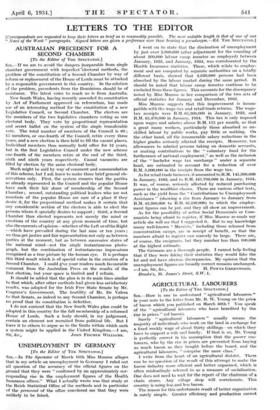LETTERS TO THE EDITOR
[Correspondents are requested to keep their letters as brief as is reasonably possible. The most suitable length is that of one of our Nezvs of the Week " paragraphs. Signed letters are given a preference over those bearing a pseudonym.—Ed. TILE SPECTATOR.]
AUSTRALIAN PRECEDENT FOR A SECOND CHAMBER.
[To the Editor of THE SPECTATOR.] SIR,—If we are to avoid the dangers inseparable from single chamber government with imperfect electoral methods, the problem of the constitution of a Second Chamber by way of reform'or replacement of the House of Lords must be attacked by a responsible gOvernment in this country. In the solution of the problem, precedents from the Dominions should be of assistance. The latest voice to reach us is from Australia.
New South Wales, having recently amended its constitution by Act of Parliament approved on referendum, has made use of an interesting method for the constitution of a new Legislative Council, or Second Chamber. The electors are the members of the two legislative chambers voting as one electoral body. They vote by proportional representation and secret ballot on the system of the single transferable vote. The total number of members of the Council is 60 ; 15 members, or one-fourth of the Council, retire every three years, and a new election is then held to fill the vacant places. Individual members thus normally 'hold office for 12 years, but in the first Legislative Council under the new scheme one-fourth of the members retire at the end of the third,
• sixth and ninth years respectively. Casual vacancies are filled by election by the same electoral body.
Much might be said by way of comment and commendation of this scheme, but I ask leave to make three brief general ob- servations only.- First, the system ensures that the parties as already represented in the Council and the popular House have each their fair share of membership of the Second Chamber ; second, outstanding political leaders who are not members of the popular House are sure of a place if they desire it, for the proportional method makes it certain that any considerable section of the electors .is able to elect the persons whom it specially desires to support ; third, a Second Chamber thus elected represents not merely the mind or emotions of the country at any given moment of time, but ' also the currents of opinion—whether of the Left or of the Right —which have prevailed during the last nine or ten years ; we thus get justice and fair representation not only as between parties at the moment, but as between successive states of the national mind—not the single instantaneous photo- graph, but the combination of instantaneous impressions recognized as a true picture by the human eye. It is perhaps this third result which is of special value in the creation of a Second Chamber. I could give your readers much favourable ' comment from the Australian Press on the results of the first election, but your space is limited and I refrain.
It should be added that the plan is in its main lines similar to that which, after other methods had given less satisfactory results, was adopted for the Irish Free State Senate by Mr. Cosgrave's Government. The hostility of Mr. De Valera to that Senate, as indeed to any Second Chamber, is perhaps no proof that its constitution is defective.
I do not contend that the New South Wales plan could be adopted in this country for the full membership of a reformed House of Lords. Such a body should, in my judgement, contain an element not recruited from political life. But I leave it to others to argue as to the limits within which such a system might be applied in the United Kingdom.—I am,








































 Previous page
Previous page